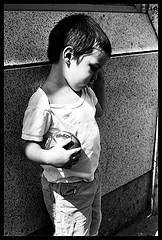“Loss” – The “L” Word

By: Jane Samuel
Driving to school this morning my youngest (chronological age 11, emotional age – always open for debate) and I were discussing her father’s upcoming business trip to Asia. Pulling up to a stoplight, I glanced sideways and did a quick check of her demeanor. While she has gotten much better in the past few years about family members coming and going in her life, I still try to be on the lookout for signs that an upcoming loss – albeit a temporary one – might flip her internal emotional balance on its end. “Trigger her” as we say in the therapeutic parenting business.
I’m So Strong . . .
by: Julie Beem
“I’m so strong that I could destroy this whole house.” His declaration was matter-of-fact, not launched as a threat but to gauge my response. “Really?” I responded, “why would you want to destroy my house?” “Because I’m powerful enough.”
Letting Go
by: Jane Samuel
She calls me from the spa-sleep-over-birthday-party and I am not surprised. There is a catch in her voice and she is asking me to bring money. I don’t question. I just get in the car and drive to her.
Abandoned
By: Jane Samuel
I knew the minute my husband pulled out of the lot and darted across the street to drop me at the pharmacy that it was a bad idea. Our youngest had run back into the retirement home where my father lived to retrieve a forgotten item and my husband thought it would be quicker to pull across, drop me, and run back and get her while I shopped. Problem is he didn’t tell her. He just figured he could get back before she noticed. Wrong.
Resilience – Inborn or Learned – Part 2
By: Julie Beem
The listing of factors that make children resilient from Resilience Theory: A Literature Review by Adrian DePlessis VanBreda made total sense to me. But the paragraph of conclusion supposedly based on these factors did not:
Resilience – Inborn or Learned – Part 1
By: Julie Beem
There’s a lot of talk about resilience being the antidote to trauma. Lots of workshops, books, and training programs talk about building resilience in kids as a way to counteract the impact of trauma in their lives. On the surface all this seems to make sense, but it’s always puzzled me. What did people mean by resilience, and why does it appear that my child has none, even after years of parenting her?
Dos & Don’ts: An Adoptive & Foster Parent’s Letter to Family and Friends
ATN is delighted to include another post from Carol Lozier. Carol, a member of ATN’s Board of Directors, is a clinical social worker in private practice in Louisville, Kentucky. Her website, www.forever-families.com, offers a blog, free downloadable tools for families, an excerpt of her book, and a supportive community of adoptive and foster parents.
By: Carol Lozier
Have you ever noticed that adopted and foster kids are especially cute? Their beautiful eyes, cute noses, and charming smiles often call attention to them and to their family. In the midst of this attention, adoptive and foster parents often hear remarks of how their parenting could be more effective, or possibly that they are expecting too much or too little from their child. Understandably, parents are caught off guard as they are hit with a critical comment, and sometimes are not sure how to address them.
I wrote the following letter, found on page 63 of The Adoptive & Foster Parent Guide, to help families express their needs and requests to their family, friends, church, after school caregivers, teachers, physicians, and others. Parents, please copy and use this letter; share it with your adoptive and fostering friends. Send the letter to any person(s) in your life who may gain a new understanding of how to help you and your family.
What’s in a Name? Part 3 – Misdiagnoses/Misunderstandings
By: Julie Beem
My child has __________________ (pick one or several: Bipolar, ADHD, autism, ODD, anxiety, executive functioning problems). When parents of traumatized children turn to professionals for diagnoses and treatment, coming away with at RAD or Developmental Trauma Disorder diagnosis isn’t a sure thing. If I had a dollar for every time a parent told me, “but my child has only been diagnosed with ADHD,” I could fund ATN’s activities well into the next decade. Nearly every child I’ve met with attachment or trauma problems carries an ADD or ADHD diagnosis. Don’t misunderstand me, children can have both attachment & trauma problems and ADHD. But do they always co-exist? No
Getting Their Ticket Punched
By: Marc Deprey
I’m not sure this is some great revelation, but this idea came to me this morning and it put a lot into perspective for me. We all know as adults (or at least I hope we all do) that we can’t expect the world to fit to us, that we know down deep that we need to fit the world and meet its basic requirements. That’s a fundamental truth we accept almost unconsciously and it allows us to navigate things pretty successfully overall.
Are Dead Children the Benchmark for Adoption?
By: Julie Beem
This whole Russian adoption ban issue is ridiculous!
There, I said it. I suspect many of you were thinking it. A knee-jerk political reaction designed to make Americans in general, and American adoptive parents in particular, look like violent, evil monsters. The Russian government uses the deaths of 15 Russian-born adoptees as the fuel to stop thousands of adoptions and to insist that they be allowed to come to this country to provide oversight on our adoptive families.